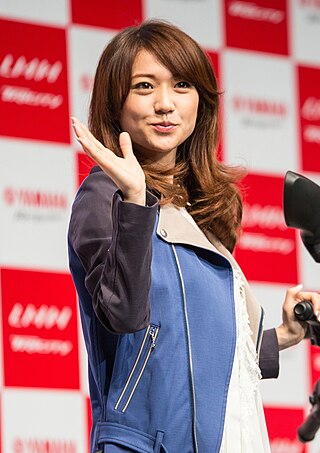
Aya Ueto is a Japanese actress, singer and television personality. In 1997, Ueto participated in the seventh Japan Bishōjo Contest, where she won the special jury prize. Soon thereafter, Ueto joined the talent agency Oscar Promotion and began taking singing, dancing and acting lessons. In 1999, she formed the girl group Z-1 with three fellow Japan Bishōjo Contest participants. The group disbanded in 2002 and later that year, Ueto signed with Pony Canyon and released "Pureness", her debut single as a lead artist. She has since released five studio albums which have spawned ten Oricon top-ten singles.

Shun Oguri is a Japanese actor and voice actor, son of stage director Tetsuya Oguri, and the youngest of 3 siblings, including older brother Ryo, who is also an actor.

Yuko Oshima is a Japanese actress and former member of idol girl group AKB48, of which she was the captain of Team K. She was also a member of the AKB48 subunit Not Yet. In addition to the singles that involved the rock-paper-scissors tournaments, she sang on the title tracks for all of AKB48's singles since Aitakatta in October 2006. She placed among the top two of the annual AKB48 general elections from 2009 to 2013. Oshima is currently represented with Ohta Production.

"Don't Cry Anymore" is Japanese singer-songwriter miwa's debut major label single, released on March 3, 2010. It was used as the Nana Eikura starring drama Nakanai to Kimeta Hi's theme song. It was certified gold by the RIAJ for full-length cellphone downloads.

"Change" is a song by Japanese singer-songwriter miwa, released on September 1, 2010. The song is best known for being an opening track in the Bleach anime series.
Aya Tademaru better known by the stage name Haruka Ayase, is a Japanese actress who started her career as a model in the year 2000. She has since become a leading actress in television and film.

Kengo Kora is a Japanese actor.

Gen Hoshino is a Japanese singer-songwriter, musician, actor, and writer.
Flower was a Japanese pop girl group formed and managed by LDH from 2009 to 2019 and signed to the record label Sony Music Japan. They were a dance and vocal unit of collective girl group E-girls alongside Happiness, Dream and three other original E-girls members. The group consisted of one vocalist and four performers at the time of their disbandment.

Nanase Nishino is a Japanese actress, model, television host, and former first generation member of Japanese idol girl group Nogizaka46. Her lead roles in TV and film have included Asahi Tōjima in Asahinagu and Ai Amano in Denei Shojo: Video Girl Ai 2018. She co-hosts the Fuji TV variety show Lion no Goo Touch.

Hiroomi Tosaka is a Japanese singer and actor. He is a vocalist of the J-pop group, Sandaime J Soul Brothers He joined the group after winning the Vocal Battle Audition 2 alongside Ryuji Imaichi. As a member of Sandaime J Soul Brothers, he has received the Japan Record Awards twice.
Maiko is a Japanese actress who is represented by the talent agency GR Promotion.
Anri Sakaguchi is a Japanese variety entertainer.

Kentaro Sakaguchi is a Japanese actor and model. He debuted as a model in Men's Non-no magazine in 2010, and as an actor under Tristone Entertainment in 2014. He has since starred in television series Tokyo Tarareba Musume (2017) and Signal (2018), as well as films The 100th Love with You (2017) and Color Me True (2018).
Hanako Takigawa, stage name Hanako (華子) is a Japanese actress, tarento and gravure idol. Her real name and former stage name is Hanako Ouchi.
Kaname Endo is a Japanese actor. His real former stage name is Shiro Komiya.

Akiko Kuji is a Japanese actress, announcer, model, and television personality. She served as an announcer for Fuji Television from 2017 until 2022.

"Kaibutsu" is a song by Japanese duo Yoasobi from their second EP, The Book 2 (2021). It was released as a single through Sony Music Entertainment Japan on January 6, 2021, the same date as the duo's debut EP, The Book. As an opening theme for the second season of the anime television series Beastars, "Kaibutsu" is about a carnivore trying to coexist with herbivores in a cruel world, based on Jibun no Mune ni Jibun no Mimi o Oshi Atete, written by the anime's writer Paru Itagaki.

"Baka Majime" is a song by Japanese hip-hop duo Creepy Nuts, record producer and musician Ayase, and singer-songwriter Lilas Ikuta. It was released as a single on March 20, 2022, through Sony Music Associated Records. The song was featured on the All Night Nippon 55th-anniversary stage drama Ano Yoru o Oboe Teru. Later, "Baka Majime" was included on Creepy Nuts' third studio album Ensemble Play (2022).

"Monotone" is a song by Japanese duo Yoasobi for the 2024 Japanese animated film Fureru as a theme. It was released as a single on October 1, 2024, by Echoes and Sony Music Entertainment Japan. The song was written by Ayase and based on the short story Fureru. no, Zen'ya. written by the film's writer Mari Okada.














